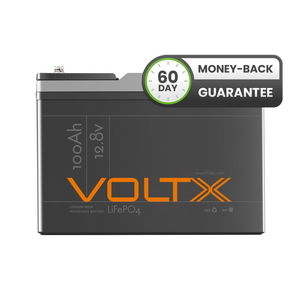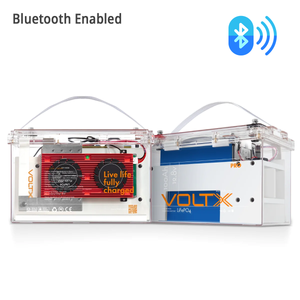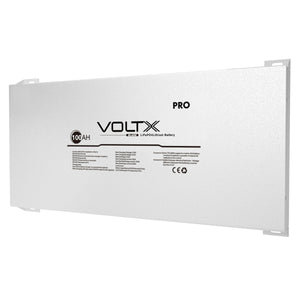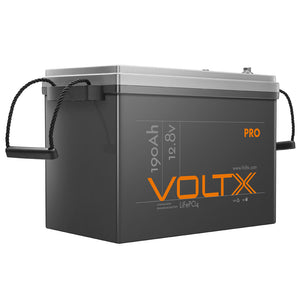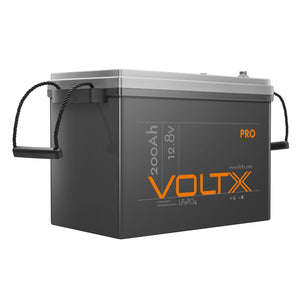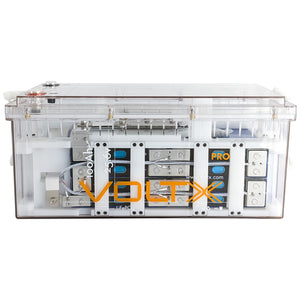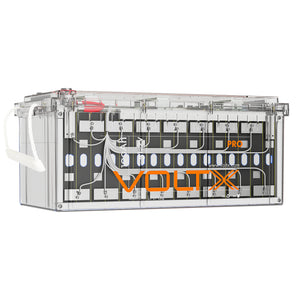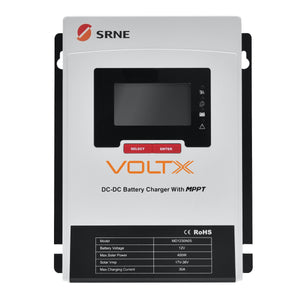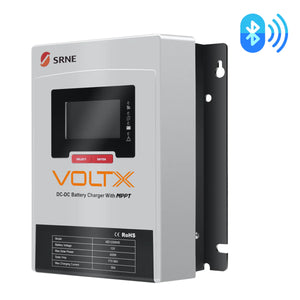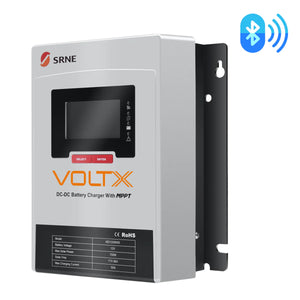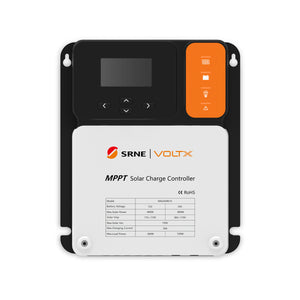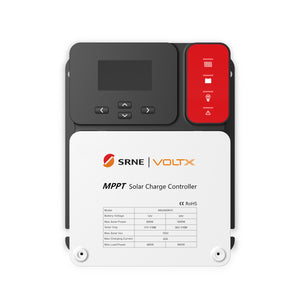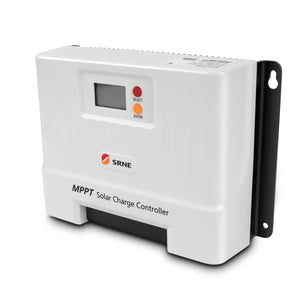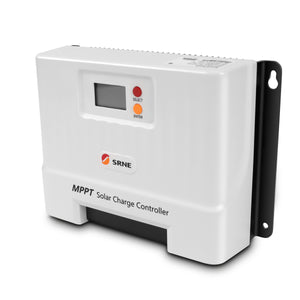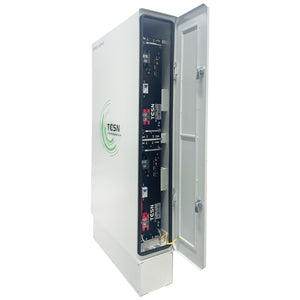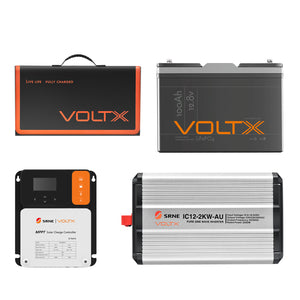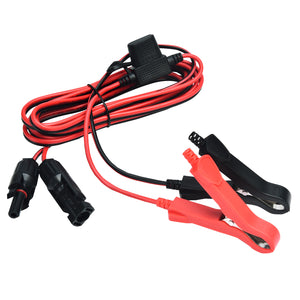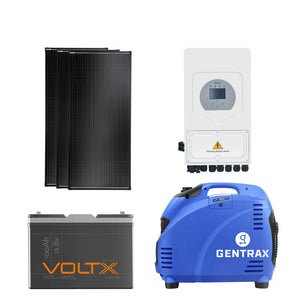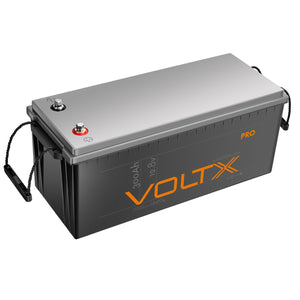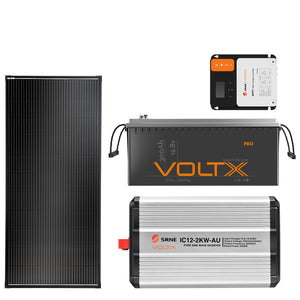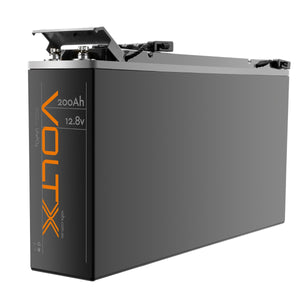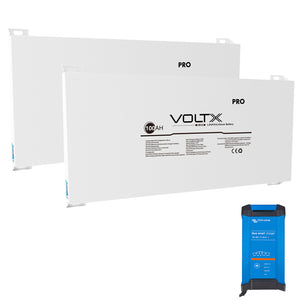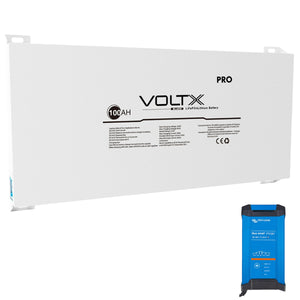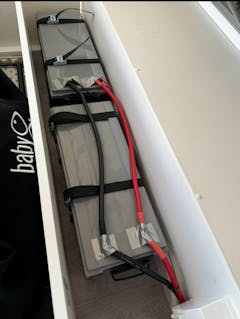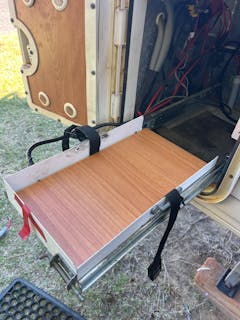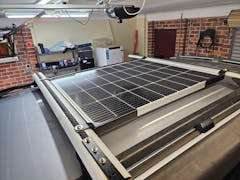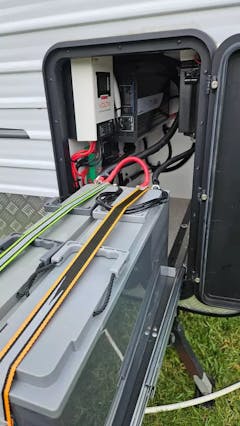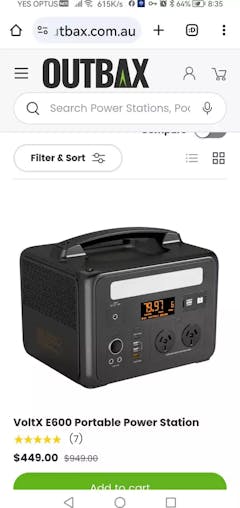Queens 12V 95AH Lithium Iron Phosphate Battery LiFePO4 Prismatic Cells Camping
Was$399.00Now $319.20Unit price /UnavailableVoltX 12V 100Ah Bluetooth Daly Lithium LiFePO4 Battery
Was$1,149.00Now $919.20Unit price /UnavailableVoltX 12V 190Ah Pro Lithium LiFePO4 Battery
Was$1,049.00Now $839.20Unit price /UnavailableLow stockVoltX SRNE 12V 30A DC-DC MPPT LiFePO4 Battery Charger
Was$289.99Now $231.99Unit price /UnavailableVoltX SRNE 12V 30A DC-DC MPPT LiFePO4 Battery Charger with Bluetooth
Was$319.99Now $255.99Unit price /UnavailableVoltX SRNE 12V 50A DC-DC MPPT LiFePO4 Battery Charger with Bluetooth
Was$359.99Now $287.99Unit price /UnavailableVoltX SRNE 12V/24V 30A MPPT Solar Charge Controller
Was$169.99Now $135.99Unit price /UnavailableVoltX SRNE 12V/24V 60A MPPT Solar Charge Controller
Was$299.99Now $239.99Unit price /UnavailableVoltX SRNE 12V/24V 40A MPPT Solar Charge Controller
Was$159.99Now $127.99Unit price /UnavailableTCSN Battery Cabinet for 5120Wh 51.2V 100Ah LiFePO4 Battery Module
Was$559.00Now $447.20Unit price /UnavailableBUNDLE DEAL - VoltX 12V 100Ah Lithium Battery + 100W Solar Blanket + 2000W Inverter + Controller
Was$1,529.00Now $1,223.20Unit price /UnavailableBUNDLE DEAL - VoltX 12V 100AH Lithium Battery + 8KW Inverter + 3* 200W Solar Panel + 3.5KW Generator
Was$6,029.00Now $4,823.20Unit price /UnavailableVery low stock- Was
$2,789.00Now $2,231.20Unit price /Unavailable BUNDLE DEAL - Victron Smart IP22 SLA + 2* VoltX 12V 100Ah Blade Lithium Battery
Was$2,199.00Now $1,759.20Unit price /UnavailableBUNDLE DEAL - Victron Smart IP22 SLA + VoltX 12V 100Ah Blade Lithium Battery
Was$1,249.00Now $999.20Unit price /Unavailable
High Performance Lithium Battery
When you're exploring the vast Australian outback or setting up camp along pristine coastlines, reliable power is essential for modern adventures. A quality lithium battery has become the cornerstone of efficient energy storage, offering unprecedented freedom for camping enthusiasts, caravan travellers, and boat owners across Australia. Unlike traditional power solutions that often fall short in demanding conditions, today's advanced battery technology delivers consistent performance whether you're running essential appliances in your caravan, powering navigation equipment on your boat, or maintaining an off-grid setup in remote locations.
The evolution of energy storage has transformed how Australians experience the outdoors, with lightweight, long-lasting options now available to suit every adventure style and power requirement. From weekend camping trips to extended journeys across the continent, choosing the right lithium batteries in Australia means never compromising on comfort or connectivity whilst embracing the freedom of outdoor living.
Understanding LiFePO4 Lithium Power Solutions
LiFePO4 (Lithium Iron Phosphate) batteries represent the pinnacle of lithium battery technology, offering Australian adventurers a superior power solution that excels in our challenging conditions. These advanced batteries deliver an exceptional lifespan with thousands of charge cycles, significantly outlasting traditional alternatives whilst maintaining consistently high performance throughout their service life. The lightweight nature of LiFePO4 technology proves invaluable for mobile applications, reducing overall vehicle weight in caravans and boats whilst maximising available power capacity.
Enhanced safety features inherent to lithium iron phosphate batteries include thermal stability and resistance to overheating, making them ideal for Australia's extreme temperatures. Deep discharge capabilities allow users to access up to 100% of the battery's rated capacity without damaging internal components, whilst the integrated Battery Management System (BMS) continuously monitors and protects against overcharging, over-discharging, and short circuits. This combination of longevity, safety, and reliable power output makes the LiFePO4 battery the smart choice for any Australian adventure.
Choosing Your Ideal Lithium Battery
Matching Capacity Ah to Your Needs
Understanding Amp hours (Ah) is crucial when selecting a lithium battery that perfectly matches your power requirements without unnecessary expense or weight. For typical camping setups running LED lights, phone chargers, and a portable fridge, a 100Ah lithium battery often provides the ideal balance of capacity and portability. Larger installations in caravans or boats requiring power for multiple appliances, water pumps, and entertainment systems typically benefit from a 200Ah lithium battery or even 300Ah configurations.
Calculating your daily power consumption by adding up the amp draw of all devices helps determine whether you need the popular 100Ah battery option for weekend trips or should consider a 120Ah lithium battery for extended adventures. The key lies in choosing sufficient capacity to comfortably meet your needs whilst avoiding excess weight and cost from oversized systems.
Perfect for Your Aussie Adventures
Whether you're chasing sunsets across the Simpson Desert or anchoring in secluded bays along the Great Barrier Reef, these versatile power solutions adapt seamlessly to quintessential Australian adventures. A lithium camping battery transforms basic campsites into comfortable retreats, powering everything from portable fridges to LED lighting systems without the noise and fumes of generators. Caravan enthusiasts appreciate how lithium batteries Australia options provide reliable power for extended touring, whilst lithium marine batteries ensure crucial navigation and communication equipment remains operational in saltwater environments.
The deep-cycle nature of lithium solar batteries makes them perfect partners for rooftop panels, storing abundant sunshine for use during overcast days or nighttime requirements. For RV owners traversing the continent, a dedicated lithium RV battery delivers the consistent power needed for air conditioning, cooking appliances, and entertainment systems, ensuring comfort regardless of location. This adaptability to diverse applications, combined with superior performance in extreme temperatures, makes these batteries essential equipment for serious Australian adventurers.
Considering Form Factors: Slimline and Blade Batteries
Space constraints in utes, boats, and compact caravans demand innovative solutions, making the slimline lithium battery an increasingly popular choice amongst space-conscious adventurers. These slim design batteries maximise power storage whilst fitting into tight spaces under seats, in narrow compartments, or alongside existing equipment where traditional batteries simply won't fit. Blade battery configurations offer similar space-saving advantages with their flat profile, proving particularly valuable in modern vehicle installations where every centimetre counts.
The Smart Advantage Bluetooth BMS
Modern battery technology embraces connectivity through Bluetooth-enabled Battery Management Systems, transforming how users monitor and maintain their power systems. Smart battery features allow real-time monitoring of voltage, current draw, state of charge, and temperature directly from your smartphone, providing peace of mind and preventing unexpected power failures. This wireless battery monitoring capability proves invaluable when batteries are installed in hard-to-reach locations, whilst advanced systems like Daly BMS units offer comprehensive diagnostics and customisable alerts for optimal battery health.
Why Upgrade Your Power System
LiFePO4 vs Traditional Batteries
The superiority of LiFePO4 technology becomes apparent when comparing key performance metrics against traditional lead-acid alternatives like AGM or Gel batteries. Whilst lead acid batteries typically last 500-1000 cycles, a quality lithium battery delivers 3000-5000 cycles or more, representing exceptional long-term value despite higher initial investment. Weight reduction of up to 70% compared to equivalent AGM batteries transforms vehicle handling and fuel efficiency, whilst the ability to use 100% of rated capacity versus only 50% in lead-acid means smaller batteries can deliver equivalent usable power. Zero maintenance requirements eliminate the hassle of water top-ups and equalisation charges, whilst superior safety characteristics and stable voltage output throughout the discharge cycle ensure consistent appliance performance.
Long Term Value and Reliability
Investing in a lithium deep cycle battery represents a commitment to reliable, cost-effective power that pays dividends over years of faithful service. The extended lifespan translates to lower cost per cycle compared to frequently replaced lead-acid batteries, whilst consistent performance in extreme temperatures ensures dependable power whether crossing the scorching Nullarbor or camping in Tasmania's alpine regions. This durability and reliability prove especially crucial for remote area travellers who cannot afford power system failures far from civilisation, making the initial investment in quality lithium technology a wise long-term decision.
Getting the Most From Your Battery
Essential Accessories Battery Chargers and Boxes
Maximising battery performance and lifespan requires using purpose-built LiFePO4 chargers that deliver optimal charging profiles specifically designed for lithium chemistry. A quality lithium battery charger prevents overcharging whilst ensuring complete cell balancing, essential for maintaining peak capacity over thousands of cycles. Protective battery boxes shield your investment from physical damage, moisture, and accidental short circuits, proving particularly important in mobile applications subject to vibration and environmental exposure. For vehicle-based systems, DC-DC MPPT LiFePO4 battery chargers efficiently convert alternator output to ideal charging voltages, ensuring batteries charge properly whilst driving between destinations.
Simple Care for Lasting Performance
Despite their advanced technology, LiFePO4 batteries require minimal maintenance to deliver years of reliable service in Australian conditions. Simple battery care practices include storing batteries partially charged during extended periods of inactivity and avoiding exposure to extreme temperatures where possible. The inherently stable chemistry and integrated BMS handle most protection automatically, making these truly fit-and-forget power solutions ideal for busy adventurers who prefer exploring over equipment maintenance. Regular monitoring also helps identify any issues early, whilst following manufacturer guidelines for charging and storage ensures maximum battery lifespan and consistent lasting performance.
Final Thoughts on Energising Your Setup
Choosing the right lithium battery transforms how Australians experience outdoor adventures, providing reliable power that matches our spirit of exploration and self-sufficiency. The lightweight design, exceptional longevity, and superior performance of LiFePO4 technology make these batteries ideal companions for camping expeditions, caravan touring, marine adventures, and solar installations across our diverse landscape.
Whether you're considering a compact 100Ah lithium battery for weekend escapes, a robust 200Ah lithium battery for extended touring, or a space-saving slimline lithium battery for tight installations, the perfect solution exists within today's comprehensive range. The combination of advanced features, proven reliability in Australian conditions, and long-term value makes upgrading to lithium batteries Australia's smartest power decision for serious adventurers. Power up your next adventure with confidence, knowing your chosen battery delivers the freedom to explore further whilst maintaining all the comforts that make outdoor living truly enjoyable.
For related articles: How To Choose The Right Lithium Battery For Your Needs
Frequently Asked Questions
- What are the main advantages of a lithium battery over older types?
- How do I choose the right size or capacity (Ah) for my lithium battery?
- Are lithium batteries good for camping and caravans in Australia?
- What does BMS mean in a lithium battery?
- How long does a LiFePO4 lithium battery typically last?
- Can I use any charger for my LiFePO4 lithium battery?
- Are lithium batteries safe to use?
- What is a slimline lithium battery useful for?
- What are the benefits of a lithium battery with Bluetooth?
- What makes a 12V lithium battery a popular choice?
